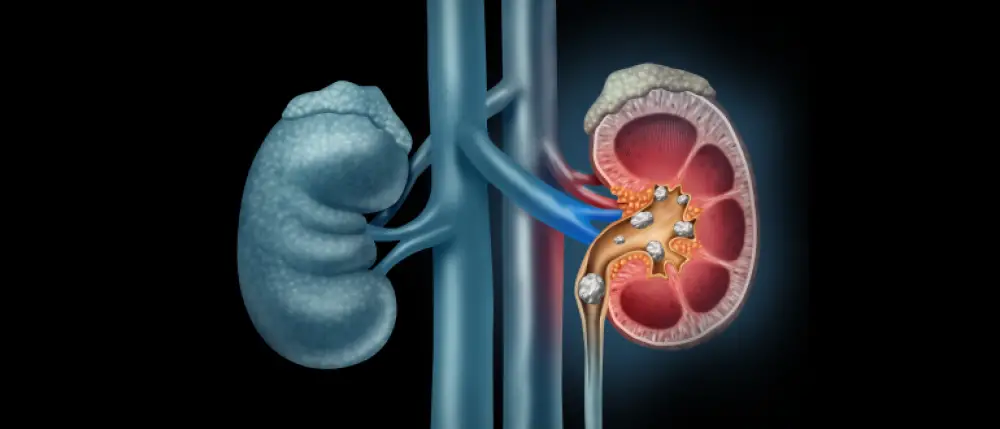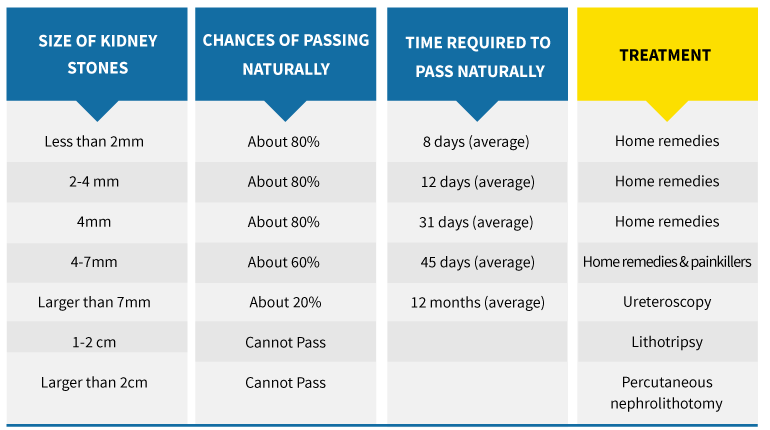Subscribe to get weekly insights
Always stay up to date with our newest articles sent direct to your inbox
Published on 25 Apr, 2023
Updated on 2 Jun, 2025
10856 Views
6 min Read

Written by Care Health Insurance
favorite1Like
Kidney stones are a common urological disease that form crystal agglomerates in the urinary tract. Also known as nephrolithiasis, urolithiasis or renal calculi, kidney stones have become prevalent, especially among men. There has been a 30-40% increase in kidney stone cases. While some stones stay in the kidneys and go undetected, others leave and have the potential to cause significant pain and, in some cases, complications. Depending on your situation, a kidney stone may pass through your urine, or you may require surgical treatment to remove it.
Read on to learn about kidney stones symptoms, causes, diagnosis, and the treatment you can opt for and get covered by a health insurance plan.
The main function of the kidneys is to eliminate waste substances contained in urine. They filter different waste materials present in the human body on a daily basis. Crystals start developing when your urine is concentrated or has too much waste. However, your urine may not have a substance that stops crystals from sticking together, creating an ideal environment for kidney stones to form. Stones can develop in one or both kidneys. Substances such as calcium, oxalate, urate, cystine, xanthine, and phosphate are attached to those crystals formed in your urine and form a solid piece of stone.
Below are the five types of kidney stones:
These are the most common stones in the kidney. It develops when the urine has high calcium levels and low citrate levels. Foods such as beets, black tea, nuts, potatoes, spinach, and chocolate are high in oxalate, which can cause calcium oxalate stones to develop. If you develop calcium oxalate stones frequently, your doctor may advise you to undergo an evaluation of your metabolism and urinary function. This requires urine and blood tests to know the exact cause. Also, your doctor may advise you to make dietary modifications to avoid the likelihood of forming kidney stones.
This kind of stone is common among women and is formed due to a urinary tract infection. These stones grow fast, become big, and sometimes occupy the entire kidney. If left untreated, they can cause severe UTIs and kidney function due to urinary tract infection.
Abnormalities in the urinary system functions cause calcium phosphate stones. Your doctor may advise you to undergo a series of urine and blood tests to determine the cause of the stone.
Uric acid stones are common among men and people who consume a lot of animal protein or don’t drink enough water. They are also found in people with a family history of stone, who have had chemotherapy, or who have gout.
Cystine stones occur due to cystinuria, a hereditary genetic disorder that leads to excessive amounts of the amino acid cystine collecting in the urine. This may result in kidney and bladder stones and ureters that move urine from the kidneys to the bladder.
You may experience the following symptoms if you have a kidney stone passing through your urinary tract, moving inside your kidney or getting stuck in your ureter (the tube that comes from the kidney to the bladder):
It is also possible that you remain asymptomatic. Also, when a kidney stone is passed through your urine, you may see it in the urine stream. It may appear as a small pebble or a small grain.
>> Also Read: 4 Valuable Tips That Will Keep Your Kidneys Healthy
Kidney stones occur for various known and unknown reasons. Possible causes include drinking less water, exercising excessively or not exercising, weight loss surgery, obesity, eating too salty or sugary food, and others. Family history and infections could also be possible causes in some people. Consuming excessive fructose found in table sugar and corn syrup also puts you at risk and can result in kidney stones.
Well, in extreme circumstances, kidney stones can be hazardous. Kidney stones can have significant implications on your health if you ignore them or keep putting off getting them treated.
>>Read Also: Acute Kidney Damage Symptoms
Passing a kidney stone at home using medication and urine is possible, but it depends on the size. Kidney stones can be as large as a golf ball and range from tiny crystals to enormous stones. Additionally, various therapies are now available, depending on their size. Smaller stones can naturally and efficiently move through the urinary tract. Find below the kidney stone size chart in mm and treatment.

Due to advancements in technology these days, many methods can help you remove your kidney stones. Below are the kidney stone removal methods:
Smaller kidney stones may get painful until you pass them through urine, which takes 1-2 days. Your doctor may suggest NSAIDs (non-steroidal anti-inflammatory drugs) to help you with pain. To ease symptoms, your doctor may also recommend-
Smaller stones usually pass through the urine if you drink fluids regularly. If, despite drinking fluids, there is hardly any sign of improvement, you may undergo a few tests.
Read Also: What are Kidney Function Tests?
If you are wondering what size of kidney stone requires surgery, let us tell you that surgery can only remove large kidney stones, as they are too hard to pass naturally. Below are the surgeries to get rid of kidney stone pain permanently-
This treatment involves high-frequency sound waves (ultrasound) to determine the exact location of the kidney stone. Shock waves track the stone and break it into smaller pieces to make it pass through your urine. Your doctor will give you painkillers before starting the process, as it could be a comfortable part of the treatment. Depending upon your stone size and other significant factors, you might need one more session to let the kidney stones pass out successfully.
This treatment involves inserting a thin, long ureteroscope through the tube. Urine passes through that tube on its way out of the body (the urethra) and into your bladder; then, it passes up into your ureter, connected with your bladder to your kidney. Your doctor may use an instrument to remove the stone gently or use laser energy to break it into small pieces to let urine pass naturally. This process makes you fall unconscious with the help of general anaesthesia.
This process involves a nephroscope, a thin telescope. A small cut is made on your back to insert the instrument that passes through the cut into your kidney. This way, the stone is pulled out or broken into smaller pieces using pneumatic energy or a laser.
The best way to avoid kidney stones is to drink enough daily water to stay hydrated. To prevent the recurrence of stones, you should strive to consume up to 3 litres of liquids daily.
We suggest that you:
Yes, generally, health insurance companies provide coverage for treating kidney stones.
At Care Health Insurance, we offer exclusively tailored health insurance plans for individuals against unforeseen medical emergencies. Out of several plans that cover kidney stones after a waiting period of 24 months, the features of Care Supreme and Care Advantage health insurance plans are described below.
Care Supreme is the most rewarding health insurance plan. It offers the following-
An extensive health insurance plan with a 6 Crore policy coverage to beat the ever-rising medical inflation in case of an emergency.
If you buy health insurance at an early age, you will not only have to pay a lower premium, but also your waiting period will end when you are healthy and there is no sign of sickness, like kidney stones. So, wait no more to protect yourself today!
Disclaimer: The information mentioned above is for reference purposes only. Also, kindly consult a professional medical expert to verify the details of health concerns.
Thyroid : मामूली नहीं हैं महिलाओं में थायराइड होना, जानें इसके लक्षण और घरेलू उपचार Vipul Tiwary in Diseases
शुगर कंट्रोल कैसे करे? जानें, डायबिटीज में क्या खाना चाहिए Vipul Tiwary in Health & Wellness
हाई ब्लड प्रेशर को तुरंत कंट्रोल कैसे करें? देखें इसके उपाय Vipul Tiwary in Diseases
पैरों में दर्द किस कमी से होता है? जानें, इसके घरेलू इलाज Vipul Tiwary in Health Insurance Articles
Nutritionist vs. Dietitian: Same Same… but Different! Leena Khowal in Health & Wellness
Silent Epidemic: Fatty Liver Disease Now Targeting the Young! Jagriti Chakraborty in Health Insurance Articles
Iodine Rich Foods: The Unsung Heroes of a Healthy Thyroid and a Sharp Mind Jagriti Chakraborty in Diet & Nutrition
Honey, Jaggery & Sugar: Which Sweetener Wins? Jagriti Chakraborty in Health & Wellness
Always stay up to date with our newest articles sent direct to your inbox
Loading...